| Srl | Item |
| 1 |
ID:
106886
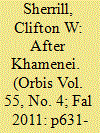

|
|
|
|
|
| Publication |
2011.
|
| Summary/Abstract |
Since succeeding the Supreme Leader Ayatollah Khomeini in 1989, Ali Khamenei has striven to make himself indispensible to the fate of Islamic fundamentalism in Iran. However, the measures Khamenei has taken to secure his power have left his succession in doubt, with no consensus heir. The lack of clear successors among the clergy, weakness of the government institutions, and concerns about regime strength could lead to instability and the potential for an Islamic Revolution Guard Corps coup.
|
|
|
|
|
|
|
|
|
|
|
|
|
|
|
|
| 2 |
ID:
106881
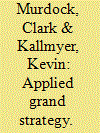

|
|
|
|
|
| Publication |
2011.
|
| Summary/Abstract |
This article hopes to contribute to the strategic content of U.S. foreign policy by offering a definition of grand strategy and case for reorienting U.S. policy around it. Rather than advocate a specific grand strategy-a matter still open for debate-the analysis concludes with a set of attributes to assess whether a proposed grand strategy constitutes a "good" grand strategy. It concludes by introducing the concept of an applied grand strategy approach, which may help to identify and assess the strategic implications of foreign policy choices.
|
|
|
|
|
|
|
|
|
|
|
|
|
|
|
|
| 3 |
ID:
106899
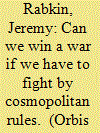

|
|
|
|
|
| Publication |
2011.
|
| Summary/Abstract |
After months of bombing, NATO achieved only a stalemate in Libya. That disappointing result may reflect NATO's commitment to respect "international humanitarian law," now understood to impose severe limits on military operations that might harm civilians. This body of rules is a departure from traditional understandings of the law of war. The embrace of these inhibiting rules raises serious questions about whether western nations are now prepared to fight and win actual wars.
|
|
|
|
|
|
|
|
|
|
|
|
|
|
|
|
| 4 |
ID:
106882
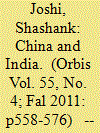

|
|
|
|
|
| Publication |
2011.
|
| Summary/Abstract |
This article surveys the key loci of Sino-Indian tension, situating them within the context of a classical if uneven security dilemma. It then examines the sources of stability within the relationship, arguing that the scope and intensity of conflict is attenuated by a series of military, political, economic and other factors. Lastly, the essay discusses the implications of the analysis for external powers, and the possible trajectories of the relationship.
|
|
|
|
|
|
|
|
|
|
|
|
|
|
|
|
| 5 |
ID:
106885


|
|
|
|
|
| Publication |
2011.
|
| Summary/Abstract |
The author reflects on our decade long conflict in Afghanistan and identifies what he considers a main contributor to the malaise. He believes it is a failure to communicate: a message of purpose which answers the oft-asked "why are we there?" question amongst Western audiences; a message of resolve on which Afghans can bet their lives that ISAF will remain there until the Taliban is beaten or compelled to reasonable compromise; and, a message of what success will look like which is accompanied by a compelling rationalization of the cost.
|
|
|
|
|
|
|
|
|
|
|
|
|
|
|
|
| 6 |
ID:
106887


|
|
|
| 7 |
ID:
106883
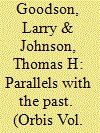

|
|
|
|
|
| Publication |
2011.
|
| Summary/Abstract |
This article assesses seven startling and unsettling similarities between Soviet strategies and tactics in Afghanistan during their Afghan war of 1979-1989 and American coalition strategies and tactics in Afghanistan since October 2001. It concludes with the implications of this dynamic. In particular, the similarities between Soviet and U.S. approaches to Afghanistan that focus on key population centers, reconciliation/reintegration, and the development of "Afghan" solutions to a variety of security concerns are extremely disturbing and, we believe, should be the focus of national attention and debate.
|
|
|
|
|
|
|
|
|
|
|
|
|
|
|
|
| 8 |
ID:
106884


|
|
|
| 9 |
ID:
106898


|
|
|
|
|
| Publication |
2011.
|
| Summary/Abstract |
In the period after World War II, an eclectic assortment of scholars, policymakers, and managers presided over the creation of academic centers for the study of war. This article examines the intellectual and administrative assumptions of many of these actors. Made up of academic scholars from the fields of political science, sociology, and economics, they advanced a vision based on what might be called "instrumentalist-positivist social science," but in appeals to donors they employed basic scientific language.
|
|
|
|
|
|
|
|
|
|
|
|
|
|
|
|
| 10 |
ID:
106888
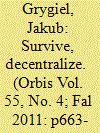

|
|
|
|
|
| Publication |
2011.
|
| Summary/Abstract |
What happens when states or empires face multiple and geographically dispersed assaults along their frontiers from non-state, tribal actors? It is plausible to argue that the result may be state decentralization, both military and administrative. In some cases, this may be a conscious strategy pursued by the central authorities, but in others, it may be the result of centrifugal tendencies pursued by disaffected local leaders. This article illustrates this argument by describing the end of the Roman empire, caused by multiple assaults of barbarian groups. The lesson is that in such an environment a centralized state that arrogates to itself all the functions of security provision may undermine its own safety.
|
|
|
|
|
|
|
|
|
|
|
|
|
|
|
|